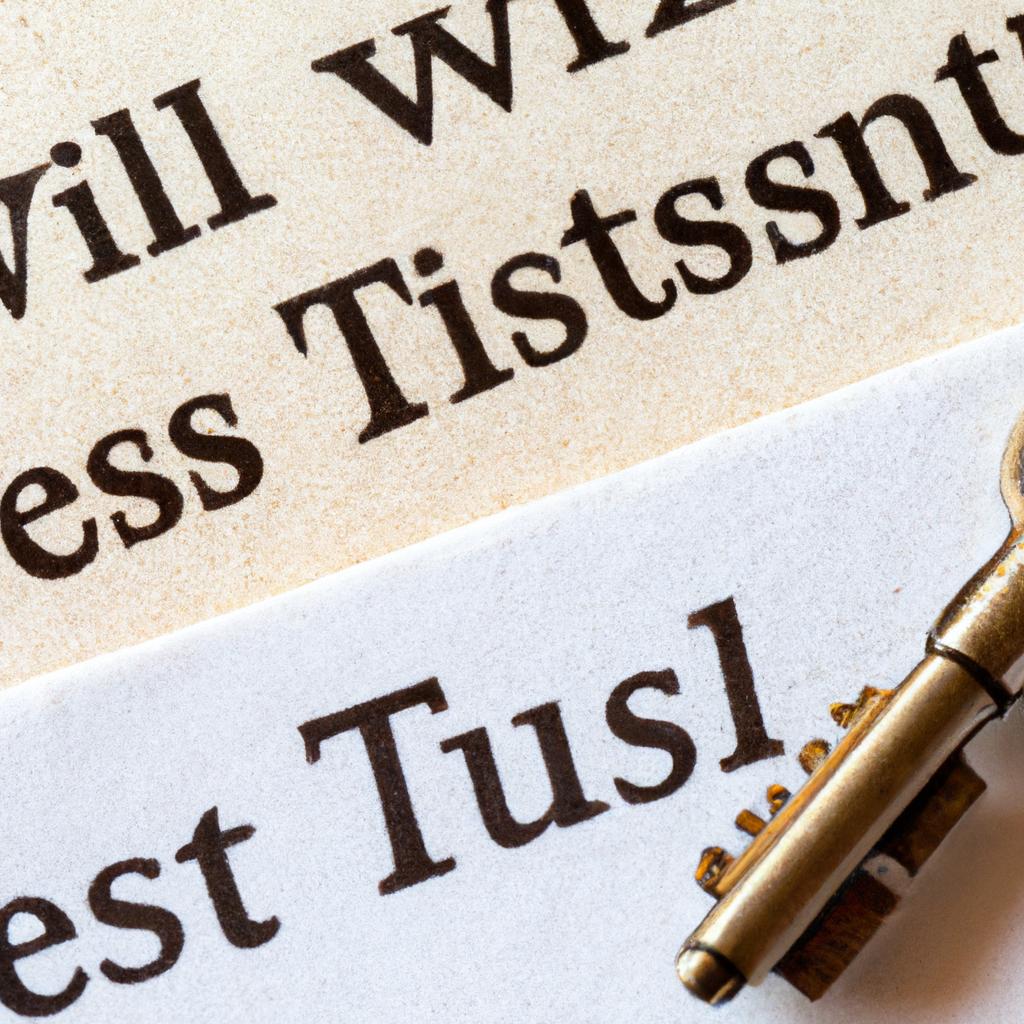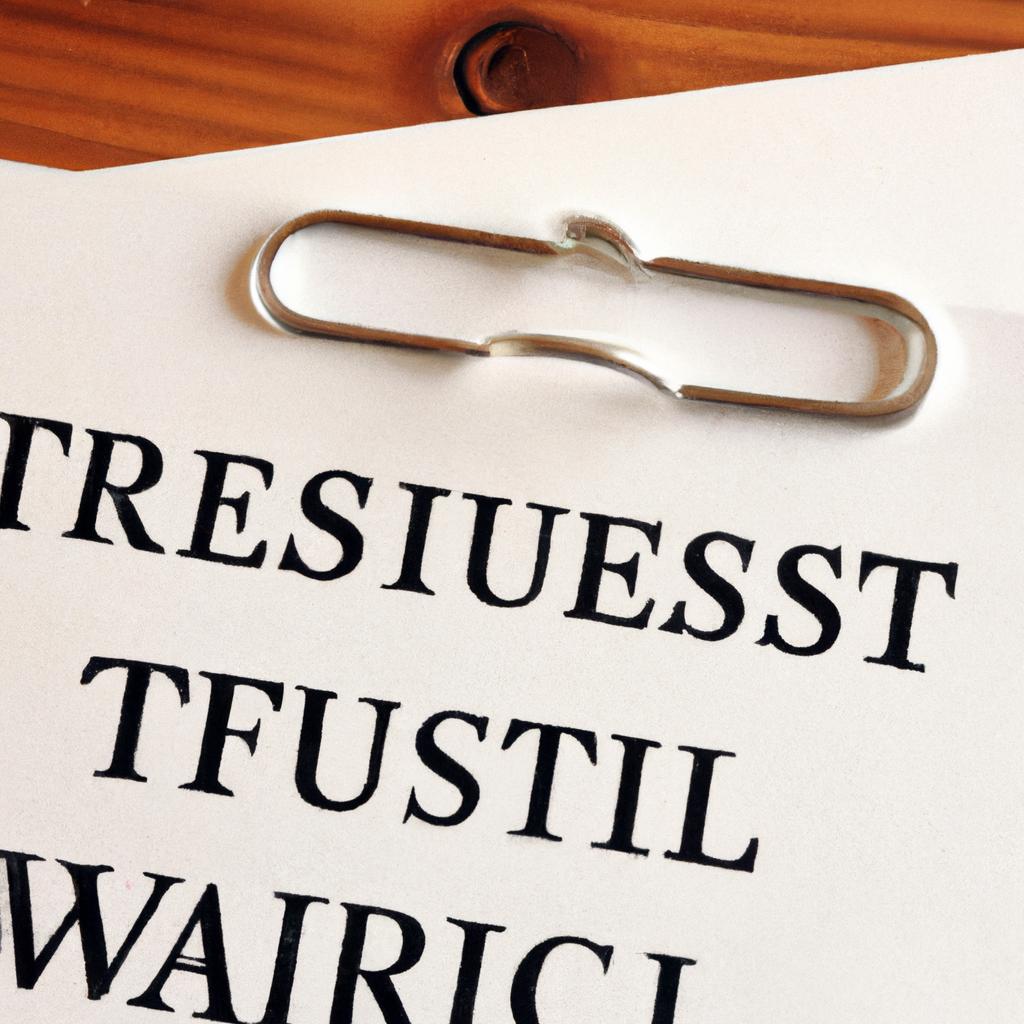In the intricate world of estate planning, the distinction between a will and a trust is often a source of confusion for many individuals. As seasoned legal professionals at Morgan Legal Group in New York City, we understand the complexities of these two essential tools for transferring assets to heirs. In this article, we will delve into the nuances of wills and trusts, shedding light on their key differences and helping you make informed decisions to safeguard your legacy.
Key Differences Between Wills and Trusts
When it comes to estate planning, understanding the is essential. A will is a legal document that outlines how a person’s assets and property should be distributed after their death. It allows individuals to specify their wishes regarding who will inherit what, who will be responsible for carrying out these wishes (executor), and who will be the guardian of any minor children. One of the main advantages of a will is that it goes into effect only after the person passes away.
A trust, on the other hand, is a legal arrangement that involves transferring assets to a trustee to manage on behalf of beneficiaries. A trust can be created during a person’s lifetime (living trust) or through a will (testamentary trust). Unlike a will, a trust can help avoid probate, provide privacy, and offer greater flexibility in asset management. Additionally, trusts can also be used to reduce estate taxes and protect assets from creditors.

Important Considerations When Choosing Between a Will and a Trust
When deciding between a will and a trust, it is crucial to consider several key factors to ensure your assets are distributed according to your wishes. One important consideration is the privacy of your estate planning documents. A will becomes a matter of public record once it goes through probate, allowing anyone to access the details of your assets and beneficiaries. On the other hand, a trust is a private document that does not go through probate, providing a higher level of confidentiality for your estate planning.
Another factor to consider is the potential for incapacity. A will only takes effect after your passing, meaning it cannot address situations where you become incapacitated. In contrast, a trust can include provisions for managing your assets in the event of your incapacity, ensuring that your financial affairs are handled according to your instructions. By carefully evaluating these and other considerations with the guidance of a knowledgeable estate planning attorney, you can make an informed decision between a will and a trust that aligns with your individual needs and goals.

Benefits of Establishing a Trust Over a Will
When planning for the distribution of your assets after you pass away, you may be considering whether to establish a trust or a will. While both options have their advantages, there are several benefits to establishing a trust that you may want to consider:
- Privacy: Unlike wills, trusts are private documents that do not go through the probate process, meaning that the details of your estate and beneficiaries remain confidential.
- Asset Protection: Trusts can offer greater protection for your assets from creditors and lawsuits, ensuring that your beneficiaries receive the full benefit of your estate.
Furthermore, trusts allow for greater flexibility in how your assets are managed and distributed, as you can specify conditions for distribution and appoint a trustee to oversee the process. This can be especially beneficial if you have complex family dynamics or wish to provide for dependents with specific needs. Overall, establishing a trust can provide peace of mind knowing that your estate will be managed according to your wishes in a private and efficient manner.

Expert Recommendations for Optimal Estate Planning Strategy
When it comes to estate planning, understanding the difference between a will and a trust is crucial in developing a comprehensive strategy. While both documents are essential for outlining the distribution of assets upon one’s passing, they serve distinct purposes and offer unique benefits. Here’s a breakdown of the key differences between a will and a trust:
- Control: A will only goes into effect after your passing, allowing you to retain full control over your assets during your lifetime. In contrast, a trust can be effective immediately upon creation, enabling you to manage and distribute assets during your lifetime and after death.
- Privacy: Wills go through probate court, making them part of public record and subject to any challenges or disputes. Trusts, on the other hand, are generally private documents that bypass probate, offering more confidentiality and a smoother transfer of assets.
Q&A
Q: What is the main difference between a will and a trust?
A: A will is a legal document that outlines how a person’s assets and property should be distributed after their death, while a trust is a legal entity that can hold assets on behalf of beneficiaries during a person’s lifetime and after their death.
Q: How does the distribution of assets differ between a will and a trust?
A: With a will, assets are distributed after the person’s death through the probate process, while a trust allows for the immediate distribution of assets to beneficiaries without going through probate.
Q: Can a will and trust work together?
A: Yes, a will can work in conjunction with a trust to ensure that all of a person’s assets are distributed according to their wishes. The will can also designate a trust as the beneficiary of certain assets.
Q: Which option is more advantageous in terms of privacy?
A: A trust is generally more advantageous in terms of privacy as it does not become a matter of public record like a will does through the probate process.
Q: How does the management of assets differ between a will and a trust?
A: A will only goes into effect after a person’s death, while a trust can manage assets during a person’s lifetime, in the event of incapacitation, and after their death.
Q: Can a will be changed after it has been created?
A: Yes, a will can be updated or changed at any time by the person who created it, as long as they have the mental capacity to do so. A trust can also be amended or revoked by the grantor.
Final Thoughts
In the end, whether you choose a will or a trust, the most important thing is to have a plan in place for your assets and loved ones. Both documents serve different purposes and can be valuable tools in estate planning. It’s crucial to seek the advice of a legal professional to determine which option best suits your individual needs and circumstances. Remember, the decisions you make now can have a lasting impact on your legacy. So, take the time to consider your options carefully and ensure that your wishes are clearly outlined for the future. So, whether you’re writing a will or setting up a trust, make sure your wishes are known and your loved ones are taken care of.
 With the rise of online will-writing services and do-it-yourself estate planning kits, it’s easy to overlook the importance of properly setting up your estate. Many people mistakenly believe that a simple will is enough to secure their assets and protect their loved ones after they pass away. However, there is another important legal document that can be just as crucial in managing and distributing your estate – a trust. Both wills and trusts serve different purposes and offer unique benefits. In this article, we’ll dive into the differences between the two and help you understand which one is right for your personal circumstances.
With the rise of online will-writing services and do-it-yourself estate planning kits, it’s easy to overlook the importance of properly setting up your estate. Many people mistakenly believe that a simple will is enough to secure their assets and protect their loved ones after they pass away. However, there is another important legal document that can be just as crucial in managing and distributing your estate – a trust. Both wills and trusts serve different purposes and offer unique benefits. In this article, we’ll dive into the differences between the two and help you understand which one is right for your personal circumstances.
Definition of a Will and a Trust
A will and a trust are both estate planning documents that help you specify how your assets will be distributed after your death. They are both revocable, meaning that you can make changes to them at any time during your lifetime. However, there are some key differences in how they function and their level of protection.
A will, also known as a last will and testament, is a legal document that outlines your wishes for your assets and outlines who will inherit them after you pass away. It also names an executor, who is responsible for managing your estate and carrying out your wishes. The probate court supervises the execution of the will and ensures that your wishes are followed.
A trust, on the other hand, is a legal arrangement where a trustee holds and manages your assets for the benefit of your beneficiaries. It provides more control over how your assets are managed and distributed, and it can also offer tax benefits and asset protection. The trustee can be an individual or a financial institution, and you can even act as the trustee for your own trust during your lifetime.
Key Differences Between a Will and a Trust
1. Distribution of assets: Wills specify how your assets will be distributed and to whom. However, the distribution process can be lengthy and expensive as it goes through the probate court. A trust, on the other hand, allows for seamless and private distribution of assets without going through probate.
2. Asset protection: A will does not protect your assets from creditors and lawsuits. In contrast, a trust can provide a level of protection for your assets from potential lawsuits or creditors.
3. Privacy: Wills are public documents, meaning that anyone can access them and see how your assets are being distributed. Trusts, on the other hand, remain confidential, providing a level of privacy for your beneficiaries.
4. Flexibility: Wills are more flexible as they can be easily modified or revoked at any time. However, a trust offers the flexibility of managing your assets during your lifetime and after your death.
5. Cost: Wills typically have lower upfront costs, but they can become more expensive during the probate process. Trusts can have higher upfront costs, but they can save your beneficiaries time and money in the long run.
Benefits and Practical Tips
Both wills and trusts have their respective benefits, and it’s important to understand which one is suitable for your personal situation. Some practical tips that can help you make the right decision include:
1. Evaluate the complexity of your assets: If you have a simple estate with few assets, a will may be sufficient for your needs. However, if you have a diverse portfolio with assets such as real estate, investments, and life insurance policies, a trust may be a better option.
2. Consider privacy: If you value privacy and don’t want the details of your assets and beneficiaries to be public knowledge, a trust may be a better choice.
3. Protect your assets: If you are concerned about protecting your assets from potential lawsuits or creditors, a trust provides more protection than a will.
4. Plan for incapacity: A will only goes into effect after your passing. A trust, however, can also act as an incapacity plan, allowing you to appoint a successor trustee to manage your assets if you become incapacitated.
Case Study – The Importance of Having Both a Will and Trust
John and Sarah were a married couple with two young children. They had a simple estate, with a house, a savings account, and a life insurance policy. They believed that a simple will was enough to ensure that their children would inherit their assets after their deaths. However, tragedy struck when both John and Sarah were in a fatal car accident.
As their will had outlined, their assets were transferred to their children after going through the probate process. However, the life insurance policy was not included in the will and went directly to their parents instead of their children. This could have been avoided if John and Sarah had set up a trust, which would have allowed them to include all their assets and specify how they should be distributed to their children.
First-hand Experience
“I’ve had a will for years, and I thought it covered all my bases. However, after discussing my estate with my lawyer, I realized that setting up a trust was a better option for me. I have peace of mind now knowing that my assets are protected and will be distributed according to my wishes without going through probate.” – Anna, 63
In conclusion, both wills and trusts are valuable estate planning tools that can help you provide for your loved ones after you pass away. However, they serve different purposes, and each has its unique benefits. It’s essential to consult with a trusted legal professional to determine which one is right for you based on your specific circumstances. Regardless of your choice, having a plan in place to secure your assets and legacy for your loved ones is crucial.

